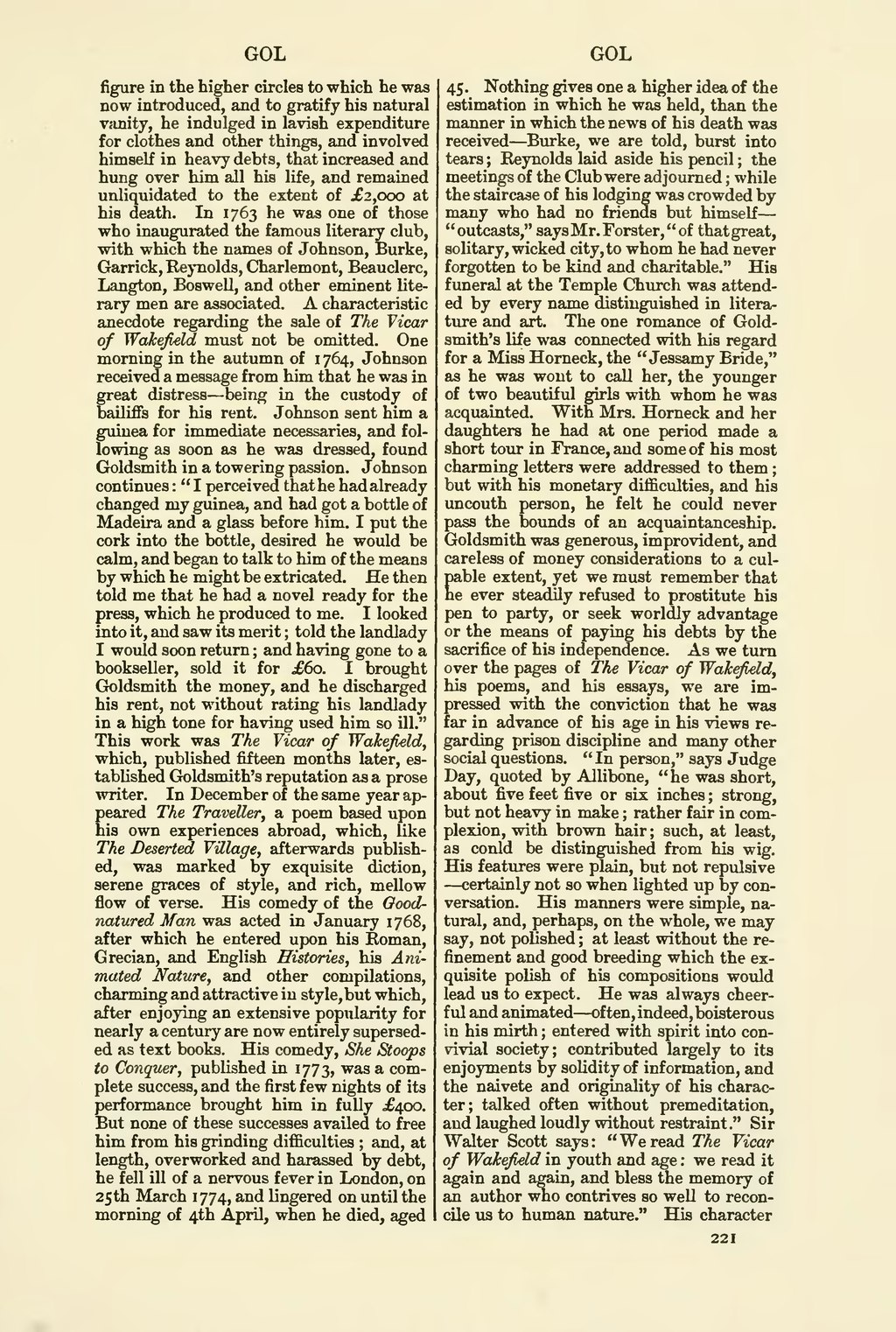figure in the higher circles to which he was now introduced, and to gratify his natural vanity, he indulged in lavish expenditure for clothes and other things, and involved himself in heavy debts, that increased and hung over him all his life, and remained unliquidated to the extent of £2,000 at his death. In 1763 he was one of those who inaugurated the famous literary club, with which the names of Johnson, Burke, Garrick, Reynolds, Charlemont, Beauclerc, Langton, Boswell, and other eminent literary men are associated. A characteristic anecdote regarding the sale of The Vicar of Wakefield must not be omitted. One morning in the autumn of 1764, Johnson received a message from him that he was in great distress— being in the custody of bailiffs for his rent. Johnson sent him a guinea for immediate necessaries, and following as soon as he was dressed, found Golldsmith in a towering passion. Johnson continues: "I perceived that he had already changed my guinea, and had got a bottle of Madeira and a glass before him. I put the cork into the bottle, desired he would be calm, and began to talk to him of the means by which he might be extricated. He then told me that he had a novel ready for the press, which he produced to me. I looked into it, and saw its merit; told the landlady I would soon return; and having gone to a bookseller, sold it for £60. I brought Goldsmith the money, and he discharged his rent, not without rating his landlady in a high tone for having used him so ill." This work was The Vicar of Wakefield, which, published fifteen months later, established Goldsmith's reputation as a prose writer. In December of the same year appeared The Traveller, a poem based upon his own experiences abroad, which, like The Deserted Village, afterwards published, was marked by exquisite diction, serene graces of style, and rich, mellow flow of verse. His comedy of the Good-natured Man was acted in January 1768, after which he entered upon his Roman, Grecian, and English Histories, his Animated Nature, and other compilations, charming and attractive in style, but which, after enjoying an extensive popularity for nearly a century are now entirely superseded as text books. His comedy, She Stoops to Conquer, published in 1773, was a complete success, and the first few nights of its performance brought him in fully £400. But none of these successes availed to free him from his grinding difficulties; and, at length, overworked and harassed by debt, he fell ill of a nervous fever in London, on 25th March 1774, and lingered on until the morning of 4th April, when he died, aged 45. Nothing gives one a higher idea of the estimation in which he was held, than the manner in which the news of his death was received — Burke, we are told, burst into tears; Reynolds laid aside his pencil; the meetings of the Club were adjourned; while the staircase of his lodging was crowded by many who had no friends but himself — "outcasts," says Mr.Forster, "of that great, solitary, wicked city, to whom he had never forgotten to be kind and charitable." His funeral at the Temple Church was attended by every name distinguished in literature and art. The one romance of Goldsmith's life was connected with his regard for a Miss Horneck, the "Jessamy Bride," as he was wont to call her, the younger of two beautiful girls with whom he was acquainted. With Mrs. Horneck and her daughters he had at one period made a short tour in France, and some of his most charming letters were addressed to them; but with his monetary difficulties, and his uncouth person, he felt he could never pass the bounds of an acquaintanceship. Goldsmith was generous, improvident, and careless of money considerations to a culpable extent, yet we must remember that he ever steadily refused to prostitute his pen to party, or seek worldly advantage or the means of paying his debts by the sacrifice of his independence. As we turn over the pages of The Vicar of Wakefield, his poems, and his essays, we are impressed with the conviction that he was far in advance of his age in his views regarding prison discipline and many other social questions. "In person," says Judge Day, quoted by Allibone, "he was short, about five feet five or six inches; strong, but not heavy in make; rather fair in complexion, with brown hair; such, at least, as could be distinguished from his wig. His features were plain, but not repulsive — certainly not so when lighted up by conversation. His manners were simple, natural, and, perhaps, on the whole, we may say, not polished; at least without the refinement and good breeding which the exquisite polish of his compositions would lead us to expect. He was always cheerful and animated — of ten, indeed, boisterous in his mirth ; entered with spirit into convivial society; contributed largely to its enjoyments by solidity of information, and the naivete and originality of his character; talked often without premeditation, and laughed loudly without restraint." Sir Walter Scott says: "We read The Vicar of Wakefield in youth and age: we read it again and again, and bless the memory of an author who contrives so well to reconcile us to human nature," His character 221
